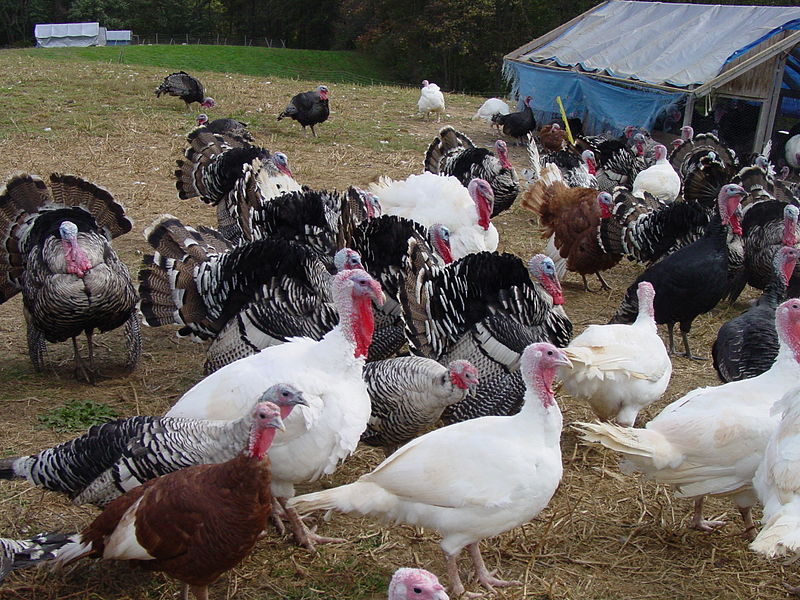I’m rejoicing in the fact that I am from New England. Autumn is our season – the reds, oranges and yellows are envied and recreated on table-settings all over the country, while we get the real thing. Thanksgiving is the time to relish in our northern bounty, and that includes the bird.

It’s pretty easy to find a local turkey, but it does take a bit of thinking ahead. What large celebration does not? (My mom’s already got me penciled in for Christmas.) If you’re reading this site, you’re probably already passionate about cooking and eating real, good ingredients. If you need more reason to start the turkey search, here’s why a local turkey rules:
- Taste. Farmers who are raising smaller flocks of turkeys usually desire to pasture raise them. They spend the whole summer and fall outdoors munching on real food themselves; bugs, seeds, and fruits they’re finding outside. You might find that the farmer’s also choose to raise heritage breeds which favor flavor, not necessarily size and growth rate.
- Organic. As stated above, you can ask if they raised their turkeys on pasture. Most-likely the meat will be pesticide and antibiotic free – you can’t say the same thing about the Butterball they’re giving away free at Shaw’s.
- Fresh. You can ask where, when and how your turkey was processed.
- Supportive of Community. Locally raised turkeys will be more expensive per pound than what you will find at the store, but you know where you’re money is going. Priceless.

This year will be my third turkey attempt, and my third local bird. I’ve been lucky – even my first solo turkey debut was surprisingly painless! (Proving that anyone can do it.)
I searched the internet for the best recipes, even finding one that explained how to fry your turkey whole. That seemed a bit dangerous, and honestly, we were going to be consuming an exorbitant amount of calories even without our bird deep-fried.
I found a wonderful article that explained that is called ‘brining.’ Brining a turkey involves marinating it for 24 hours in a salty and herb-infused liquid. You can get creative, using any assortment of your favorite fresh herbs, and even cranberry, orange or apple juice combinations. Here’s mine:
Hard Apple Cider and Herb Brined Turkey
- 1 Fresh local turkey!
- 3/4 c course salt
- Fresh sage, rosemary and thyme (any herbs you like – these are nice, strong savory choices.)
- Enough Wood Chuck hard apple cider to cover turkey (you may use non-alcoholic cider, if you wish.)
- a few cloves of crushed garlic
- butter
Place your bird in a large pot (one that has a cover would be best, because it will sit for a while) and sprinkle it with just a bit of the salt. Also rub the skin with the herbs and garlic, and throw them in the bottom of the pot along with the rest of the salt.
Fill the pot with the apple cider, being sure to cover the turkey completely. If you do not have enough cider, you can certainly add some water. Cover and just let the bird sit for up to 24 hours.
Before baking, rinse and pat the turkey dry, then rub the skin with a bit of butter for luck. Stuff as you wish. I place more herbs and a few chopped apples inside!
Where to Find a Local Turkey
- Co-op or local grocery store. Year one I ordered my turkey from City Market in Burlington, VT. They were teaming up with two Vermont farms, Misty Knoll and Stonewood Farm. You can call and ask your local market if they will be offering local birds.
- NOFA.The Northeast Organic Farming Association has a website for every New England State (except Maine, sad!) They list farmer’s markets, CSA’s, organically certified farms and more.
- Google it. Search for ‘local [insert state here] turkeys’ or even ‘[state] CSA’s.’ It’s surprising what you can find. Vermont has many wonderful websites dedicated to bringing good food to good people. Another example is VAAFM.
- Ask around. If your grocery store doesn’t get local turkey’s in-store, ask if they know about some local farms. Ask you favorite restaurant, or, if you have a veggie CSA with a farm that does not offer meat, I am sure they know where to get the good stuff.
my final tip is to look NOW. Farms have to estimate in the Spring how much demand they will get in the fall, so they’re looking to sell out ahead of time. This year, I have ordered my turkey from Maple Wind Farm in Richmond, VT. Another good choice is Applecheek Farm in Hyde Park, VT.
To secure my order, the farm requested I send a deposit of $25. I will pay the rest upon pick-up. Local, organically grown turkeys are usually around $5 per pound, and are at least 10 pounds in size. …and don’t worry you won’t be plucking feathers or chopping off heads. They’re prepared very nicely, usually sealed in plastic.
But if you had to – it might still be worth the effort.
